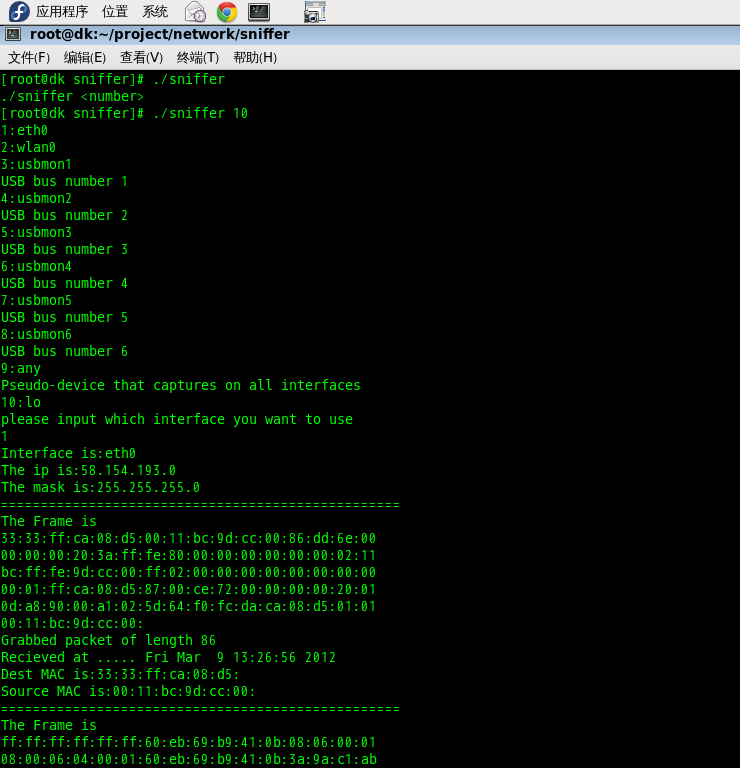linux下libpcap的使用(抓包小程序)
(1)获取网络接口名字和掩码等信息
(2)捕获数据包(单个数据包和多个数据包两种情况)
(3)以太网数据报捕获
(4)ARP数据包捕获
(5)IP数据包捕获
(6)TCP数据包捕获
(7)UDP数据包捕获
(8)ICMP数据包捕获
环境fedora13,vim,gcc
- #include<stdio.h>
- #include<string.h>
- #include<pcap.h>
- #include<sys/socket.h>
- #include<netinet/in.h>
- #include<netinet/if_ether.h>
- #include<netinet/ip.h>
- #include<netinet/udp.h>
- #include<netinet/tcp.h>
- #include<netinet/ip_icmp.h>
- #define max 1024
- /*
- typedef u_int32_t int_addr_t;
- struct in_addr
- {
- int_addr_t s_addr;
- };*/
- int call(u_char *argument,const struct pcap_pkthdr* pack,const u_char *content)
- {
- int m=0,n;
- const u_char *buf,*iphead;
- u_char *p;
- struct ether_header *ethernet;
- struct iphdr *ip;
- struct tcphdr *tcp;
- struct udphdr *udp;
- struct icmphdr *icmp;
- buf=content;
- printf("==================================================\n");
- printf("The Frame is \n");
- while(m< (pack->len))
- {
- printf("%02x",buf[m]);
- m=m+1;
- if(m%16==0)
- printf("\n");
- else
- printf(":");
- }
- printf("\n");
- printf("Grabbed packet of length %d\n",pack->len);
- printf("Recieved at ..... %s",ctime((const time_t*)&(pack->ts.tv_sec)));
- // printf("Ethernet address length is %d\n",ETHER_HDR_LEN);
- ethernet=(struct ether_header *)content;
- p=ethernet->ether_dhost;
- n=ETHER_ADDR_LEN;
- printf("Dest MAC is:");
- do{
- printf("%02x:",*p++);
- }while(--n>0);
- printf("\n");
- p=ethernet->ether_shost;
- n=ETHER_ADDR_LEN;
- printf("Source MAC is:");
- do{
- printf("%02x:",*p++);
- }while(--n>0);
- printf("\n");
- if(ntohs(ethernet->ether_type)==ETHERTYPE_IP)
- {
- printf("It's a IP packet\n");
- ip=(struct iphdr*)(content+14);
- printf("IP Version:%d\n",ip->version);
- printf("TTL:%d\n",ip->ttl);
- printf("Source address:%s\n",inet_ntoa(ip->saddr));
- printf("Destination address:%s\n",inet_ntoa(ip->daddr));
- printf("Protocol:%d\n",ip->protocol);
- switch(ip->protocol)
- {
- case 6:
- printf("The Transport Layer Protocol is TCP\n");
- tcp=(struct tcphdr*)(content+14+20);
- printf("Source Port:%d\n",ntohs(tcp->source));
- printf("Destination Port:%d\n",ntohs(tcp->dest));
- printf("Sequence Number:%u\n",ntohl(tcp->ack_seq));
- break;
- case 17:
- printf("The Transport Layer Protocol is UDP\n");
- udp=(struct udphdr*)(content+14+20);
- printf("Source port:%d\n",ntohs(udp->source));
- printf("Destination port:%d\n",ntohs(udp->dest));
- break;
- case 1:
- printf("The Transport Layer Protocol is ICMP\n");
- icmp=(struct icmphdr*)(content+14+20);
- printf("ICMP Type:%d\n", icmp->type);
- switch(icmp->type)
- {
- case 8:
- printf("ICMP Echo Request Protocol\n");
- break;
- case 0:
- printf("ICMP Echo Reply Protocol\n");
- break;
- default:
- break;
- }
- break;
- default:
- break;
- }
- /* if(*iphead==0x45)
- {
- printf("Source ip :%d.%d.%d.%d\n",iphead[12],iphead[13],iphead[14],iphead[15]);
- printf("Dest ip :%d.%d.%d.%d\n",iphead[16],iphead[17],iphead[18],iphead[19]);
- }*/
- // tcp= (struct tcp_header*)(iphead);
- // source_port = ntohs(tcp->tcp_source_port);
- // dest_port = ntohs(tcp->tcp_destination_port);
- }
- else if(ntohs (ethernet->ether_type) == ETHERTYPE_ARP)
- {
- printf("This is ARP packet.\n");
- iphead=buf+14;
- if (*(iphead+2)==0x08)
- {
- printf("Source ip:\t %d.%d.%d.%d\n",iphead[14],iphead[15],iphead[16],iphead[17]);
- printf("Dest ip:\t %d.%d.%d.%d\n",iphead[24],iphead[25],iphead[26],iphead[27]);
- printf("ARP TYPE: %d (0:request;1:respond)\n",iphead[6]);
- }
- }
- return 0;
- }
- int main(int argc,char *argv[])
- {
- if(argc!=2)
- {
- printf("%s <number>\n",argv[0]);
- return 0;
- }
- pcap_t *handle;
- pcap_if_t *alldev;
- pcap_if_t *p;
- char error[100];
- struct in_addr net_ip_addr;
- struct in_addr net_mask_addr;
- struct ether_header *ethernet;
- char *net_ip_string;
- char *net_mask_string;
- char *interface;
- u_int32_t net_ip;
- u_int32_t net_mask;
- struct pcap_pkthdr pack;
- const u_char *content;
- int i=0,num;
- if(pcap_findalldevs(&alldev,error)==-1)
- {
- printf("find all devices is error\n");
- return 0;
- }
- for(p=alldev;p;p=p->next)
- {
- printf("%d:%s\n",++i,p->name);
- if(p->description)
- {
- printf("%s\n",p->description);
- }
- }
- if(i==1)
- interface=p->name;
- else
- {
- printf("please input which interface you want to use\n");
- scanf("%d",&num);
- if(num<1||num>i)
- {
- printf("interface is unavillible\n");
- return 0;
- }
- for(p=alldev,i=1;i<=num;p=p->next,i++)
- interface=p->name;
- }
- /*
- if((interface=pcap_lookupdev(error))==NULL)
- {
- printf("%s\n",error);
- return 0;
- }*/
- if((handle=pcap_open_live(interface,max,1,0,error))==NULL)
- {
- printf("%s\n",error);
- return 0;
- }
- if(pcap_lookupnet(interface,&net_ip,&net_mask,error)==-1)
- {
- printf("%s\n",error);
- return 0;
- }
- printf("Interface is:%s\n",interface);
- net_ip_addr.s_addr=net_ip;
- net_ip_string=inet_ntoa(net_ip_addr);
- printf("The ip is:%s\n",net_ip_string);
- net_mask_addr.s_addr=net_mask;
- net_mask_string=inet_ntoa(net_mask_addr);
- printf("The mask is:%s\n",net_mask_string);
- pcap_loop(handle,atoi(argv[1]),call,NULL);
- pcap_freealldevs(alldev);
- return 1;
- }
#include<stdio.h> #include<string.h> #include<pcap.h> #include<sys/socket.h> #include<netinet/in.h> #include<netinet/if_ether.h> #include<netinet/ip.h> #include<netinet/udp.h> #include<netinet/tcp.h> #include<netinet/ip_icmp.h> #define max 1024 /* typedef u_int32_t int_addr_t; struct in_addr { int_addr_t s_addr; };*/ int call(u_char *argument,const struct pcap_pkthdr* pack,const u_char *content) { int m=0,n; const u_char *buf,*iphead; u_char *p; struct ether_header *ethernet; struct iphdr *ip; struct tcphdr *tcp; struct udphdr *udp; struct icmphdr *icmp; buf=content; printf("==================================================\n"); printf("The Frame is \n"); while(m< (pack->len)) { printf("%02x",buf[m]); m=m+1; if(m%16==0) printf("\n"); else printf(":"); } printf("\n"); printf("Grabbed packet of length %d\n",pack->len); printf("Recieved at ..... %s",ctime((const time_t*)&(pack->ts.tv_sec))); // printf("Ethernet address length is %d\n",ETHER_HDR_LEN); ethernet=(struct ether_header *)content; p=ethernet->ether_dhost; n=ETHER_ADDR_LEN; printf("Dest MAC is:"); do{ printf("%02x:",*p++); }while(--n>0); printf("\n"); p=ethernet->ether_shost; n=ETHER_ADDR_LEN; printf("Source MAC is:"); do{ printf("%02x:",*p++); }while(--n>0); printf("\n"); if(ntohs(ethernet->ether_type)==ETHERTYPE_IP) { printf("It's a IP packet\n"); ip=(struct iphdr*)(content+14); printf("IP Version:%d\n",ip->version); printf("TTL:%d\n",ip->ttl); printf("Source address:%s\n",inet_ntoa(ip->saddr)); printf("Destination address:%s\n",inet_ntoa(ip->daddr)); printf("Protocol:%d\n",ip->protocol); switch(ip->protocol) { case 6: printf("The Transport Layer Protocol is TCP\n"); tcp=(struct tcphdr*)(content+14+20); printf("Source Port:%d\n",ntohs(tcp->source)); printf("Destination Port:%d\n",ntohs(tcp->dest)); printf("Sequence Number:%u\n",ntohl(tcp->ack_seq)); break; case 17: printf("The Transport Layer Protocol is UDP\n"); udp=(struct udphdr*)(content+14+20); printf("Source port:%d\n",ntohs(udp->source)); printf("Destination port:%d\n",ntohs(udp->dest)); break; case 1: printf("The Transport Layer Protocol is ICMP\n"); icmp=(struct icmphdr*)(content+14+20); printf("ICMP Type:%d\n", icmp->type); switch(icmp->type) { case 8: printf("ICMP Echo Request Protocol\n"); break; case 0: printf("ICMP Echo Reply Protocol\n"); break; default: break; } break; default: break; } /* if(*iphead==0x45) { printf("Source ip :%d.%d.%d.%d\n",iphead[12],iphead[13],iphead[14],iphead[15]); printf("Dest ip :%d.%d.%d.%d\n",iphead[16],iphead[17],iphead[18],iphead[19]); }*/ // tcp= (struct tcp_header*)(iphead); // source_port = ntohs(tcp->tcp_source_port); // dest_port = ntohs(tcp->tcp_destination_port); } else if(ntohs (ethernet->ether_type) == ETHERTYPE_ARP) { printf("This is ARP packet.\n"); iphead=buf+14; if (*(iphead+2)==0x08) { printf("Source ip:\t %d.%d.%d.%d\n",iphead[14],iphead[15],iphead[16],iphead[17]); printf("Dest ip:\t %d.%d.%d.%d\n",iphead[24],iphead[25],iphead[26],iphead[27]); printf("ARP TYPE: %d (0:request;1:respond)\n",iphead[6]); } } return 0; } int main(int argc,char *argv[]) { if(argc!=2) { printf("%s <number>\n",argv[0]); return 0; } pcap_t *handle; pcap_if_t *alldev; pcap_if_t *p; char error[100]; struct in_addr net_ip_addr; struct in_addr net_mask_addr; struct ether_header *ethernet; char *net_ip_string; char *net_mask_string; char *interface; u_int32_t net_ip; u_int32_t net_mask; struct pcap_pkthdr pack; const u_char *content; int i=0,num; if(pcap_findalldevs(&alldev,error)==-1) { printf("find all devices is error\n"); return 0; } for(p=alldev;p;p=p->next) { printf("%d:%s\n",++i,p->name); if(p->description) { printf("%s\n",p->description); } } if(i==1) interface=p->name; else { printf("please input which interface you want to use\n"); scanf("%d",&num); if(num<1||num>i) { printf("interface is unavillible\n"); return 0; } for(p=alldev,i=1;i<=num;p=p->next,i++) interface=p->name; } /* if((interface=pcap_lookupdev(error))==NULL) { printf("%s\n",error); return 0; }*/ if((handle=pcap_open_live(interface,max,1,0,error))==NULL) { printf("%s\n",error); return 0; } if(pcap_lookupnet(interface,&net_ip,&net_mask,error)==-1) { printf("%s\n",error); return 0; } printf("Interface is:%s\n",interface); net_ip_addr.s_addr=net_ip; net_ip_string=inet_ntoa(net_ip_addr); printf("The ip is:%s\n",net_ip_string); net_mask_addr.s_addr=net_mask; net_mask_string=inet_ntoa(net_mask_addr); printf("The mask is:%s\n",net_mask_string); pcap_loop(handle,atoi(argv[1]),call,NULL); pcap_freealldevs(alldev); return 1; }
参数为要抓包的个数,抓包结果保存在save文件中。
运行部分结果:
转自http://blog.csdn.net/dk_zhe/article/details/7336448
